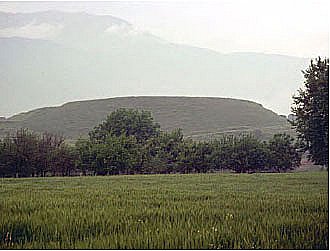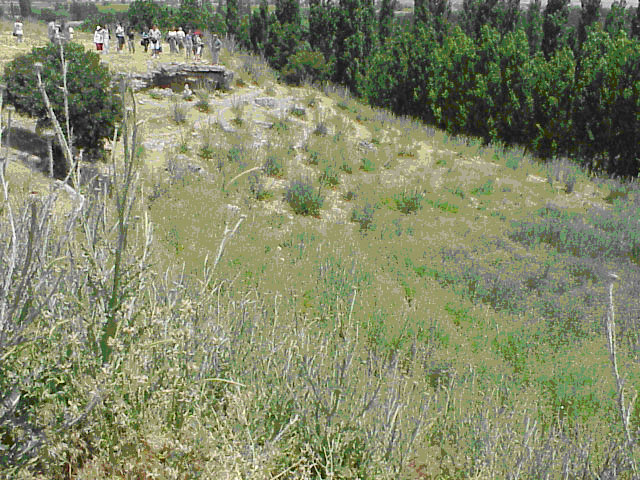TABLE OF CONTENTS
Where We’re Headed:
Colossians Outline
Introduction (1:1-8)I. The Preeminence of Christ (1:9-29)
A. The prayer of Paul (1:9-14)
B. The person of Christ (1:15-20)
C. The work of Christ (1:21-29)
II. The Warning Against Heresy (2:1-23)
A. The concern of Paul (2:1-5)
B. The safeguard against heresy (2:6-15)
C. The Description of the heresy (2:16-23)
III. The Practice of True Christian Living (3:1-4:6)
A. Its foundation (3:1-4)
B. Its principles (3:5-17)
C. Its applications (3:18-4:6)
1: Wives (3:18)
2. Husbands (3:19)
3. Children (3:20)
4. Parents (3:21)
5. Servants (3:22-25)
6. Masters (4:1)
7. Church members (4:2-6)
Conclusion (4:7-18)

The Tell
Colossae was located 120 miles east of Ephesus in the Lycus River Valley in ancient Phrygia, part of the Roman territory of Asia Minor. The location was in what is part of modern-day Turkey. It was one of a triad of cities in the area (the other two being Laodicea and Hierapolis), resting at the foot of Mount Cadmus. It’s biblical significance lies in the fact that the book of Colossians was addressed to the church here (Col 1:2) and that Philemon lived in this city.

Unexcavated
Theater.
Group is standing on the far side of the curved (unexcavated) seating area -
stage would have been on the right side of the image. (Right-Click, View Image).

Distinctive Features
There is a close resemblance to Ephesians both in content and vocabulary. Much of Colossians is repeated in Ephesians and is therefore believed that the two letters were written around the same time from the same place. Below are are some related contrasts:
COLOSSIANS
EPHESIANS
Oneness in Christ
Jew and Gentile as one in the body of Christ is a mystery
The Christ as the Body of Christ is emphasized
The Location
The tell of Colossae is about one mile north of the village of Honaz. In the 5th century B.C. Colossae was a major trade center on the trade route from Sardis to Konya, and was famous for the dark red wool cloth that carried its name, colossinum. The historian Herodotus said Colossae was an important city in his day. When Xerxes marched to Sardis and later to Thermopylae he stopped in Colossae (around 481 B.C.). The Persian king Cyrus the Younger marched his armies through the Lycus valley in 401 B.C.
The commercial importance of Colossae was lost when Laodicea was established in the first century B.C. Colossae, along with Laodicea and Hierapolis, were destroyed by earthquakes in 17 A.D. during the reign of Tiberius, and then again in 60 A.D. during the reign of Nero. By 400 A.D. Colossae no longer existed as a city. The site of Colossae has never been excavated, but the remains of a theater and a few other buildings are still discernable.
The Church
at Colossae in Asia Minor
by David Padfield
During the two years that Paul ministered at Ephesus, "all who dwelt in Asia heard the word of the Lord Jesus, both Jews and Greeks" (Acts 19:10). The church at Colossae was not established by Paul, and it is doubtful that he had ever visited the city (Col. 4:12-17).
In Colossians 2:1 he acknowledged that many of the brethren at Colossae had never seen his "face in the flesh." It is possible that Epaphras, a fellow-worker with Paul, had established the church at Colossae. Epaphras was a "faithful minister of Christ" (Col. 1:7). Epaphras, a resident of Colossae, had great zeal for the brethren in Laodicea and Hierapolis (Col. 4:12-13).
The church at Colossae was composed mainly of Gentiles (Col. 1:21). Philemon and Onesimus were members of at Colossae (Col 4:9). Archippus also lived in Colossae (Philemon 1:2; Col. 4:17).
- Gnosticism attacked the adequacy and supremacy of Christ (Col. 1:15)
- It attacked Christ's role in the Creation of the world (Col. 1:17)
- It attacked the humanity of Christ (cf. Col. 1:22)
- It offered men human philosophy (Col. 2:8)
The Heresy
(Notes from New Testament Survey by Robert Gromacki). I will be using this text as a guide for occasional class presentations.Gnosticism was a great problem in the early church. The false teaching at Colossae was a mixture or blending of Jewish legalism, Greek or incipient Gnostic philosophy, and possibly Oriental mysticism. It is difficult to say with certainty if these teachers were Jewish or Gentile. It is fairly safe to say that the teaching was either Judaistic Gnosticism or Gnostic Judaism.
The heresy at Colossae did have a strong Jewish ritualistic character whereas second-century Gnosticism manifested more of the philosophical element. It is difficult to determine whether these heretics were within the church membership or attached the church from without. Paul warned against both sources (Acts 20:29-30). Since the church was very young and did have some adequate leadership, it would seem that the heresy came as a outside threat.
As we examine Paul's teachings in Colossians, we can determine much of the nature of the heresy.
- It taught that spiritual knowledge was available only to those with superior intellect, thus creating a spiritual caste system. Faith was treated with contempt; advanced Gnosticism even taught that salvation was received by knowledge. Adherents believed that they could understand divine mysteries totally unknown and unavailable to the typical Christian.
- An influence from Greek philosophy was that all matter was innately evil and that the soul or mind was intrinsically good. This logically led to a denial of the creation of the material world by God and to a denial of the incarnation of Jesus Christ. The latter involved a repudiation of His humanity, His physical death, and His physical resurrection.
- To explain the existence of the material world, the heresy taught that a series of angelic emanations created it. According to them, God created an angel who created another angel who in turn created another angel ad infinitum. The last angel in this series then created the world. This angelic cosmogony thus denied the direct creation and supervision of the world. This conviction resulted in some practical theological errors. It stressed the transcendence of God to the exclusion of His immanence. Since God did not create the world in the past, He does not work in the world in the present. This would rule out the value of prayer or the possibility of miracles. It led to a false worship of angels. If the world resulted from angelic emanations, then the individual in the world had to work his way back to God through this series. Thus, he would have to know who those angels were and how many there were in order to give each his proper respect.
- Christ was reduced by most Gnostics into a creature, perhaps the highest being that God created. This was an attack upon the Trinity and upon the eternal, sovereign deity of Jesus Christ.
- In daily living, the heresy led to asceticism
and legalism. If matter is evil, then the body is evil. The heresy
taught that to destroy the desires of the body to satisfy the needs of
the soul, a rigid code of behavior, including circumcision, dietary
laws, and observances of feasts, had to be followed. There was much
self-denial for religious reasons.
The Purpose of Paul's Writing
During Paul's absence from Asia, this Judaistic-Gnostic heresy began to infiltrate the area. The leaders of the Colossian church were apparently unable to cope with it so they sent Epaphras to Rome to consult with Paul. Quite possibly, Epaphras was the founder and pastor of the church; when he left, Archippus assumed the pastoral responsibility (1:7; 4:17). Epaphras informed Paul of the Colossians' faith (1:4-5), their love for Paul (1:8), and the heretical threat. Unable to go to Colossae because of his imprisonment, Paul penned this Epistle and sent it to the church through Tychicus and Onesimus (4:7-9)
Paul wrote, therefore,
- To express his prayerful interest in the spiritual development of the Colossian believers (1:1-12)
- To set forth the sovereign headship of Jesus Christ over creation and the Church (1:13-29)
- To warn them against the moral and doctrinal errors of the heresy (2:1-23)
- To exhort them to a life of holiness (3:1-4:6)
- To explain the mission of Tychicus and Onesimus (4:7-9)
- To send greetings from his associates (4:10-15)
- To command the exchange of correspondence with the Laodicean church (4:16-18)
There are many systems that go under the guide of "philosophy" that are really governed by human or world standards, but humanism or antisupernaturalism, rather than by divine revelation centered in the person of Christ. Christians need to be able to distinguish between true and false philosophies. That is why we should be saturated with the Word of God.
Paul's Strategy
The Gnostics made much of wisdom (sophia), intelligence (sunesis), and knowledge (epignosis). Paul takes up the language of the Gnostics and translates it to the higher spheres of Christian thought. Against the false wisdom of the Gnostics, the apostle sets the true wisdom of the gospel. The initiatory rites of these Gnostics in which certain were inducted into their order, were secret mysteries. Paul sets over against these the fact that all the treasures of wisdom and knowledge are hidden in that comprehensive mystery, the knowledge of God in Christ.
Paul also had to combat the Gnostic teaching of successive emanations from deity, the angelic mediators who were responsible for the act of creation, and for the headship of the spiritual creation, which took the place of the Lord Jesus as Creator of the universe and Head of the Church. The apostle meets these false doctrines, by showing that "all things were created by Him," and "He is Head of the body, the Church."
As to the teaching of the Gnostics to the effect that the divine essence is distributed among the angelic emanations from deity, Paul declares that the pleroma or plenitude of the divine essence is permanently at home in the Lord Jesus. For the totality of the divine essence, the Gnostics had this word pleroma, "fullness" or "plenitude." Paul says that Jesus Christ is not only the chief manifestation of the divine nature, but He exhausts the God-head. In Him resides the totality of divine powers and attributes.
From the necessities imposed upon Paul by the character of the Gnostic heresy, it is easy to see that Bishop Lightfoot says: "The doctrine of the Person of Christ is here stated with greater precision and fullness than in any other of St. Paul's epistles."
The Complete Word Study New Testament, Spiros Zodhiates, World Bible Publishers, Inc.
Chapter 2:8-23
Gnosticism is derived from the Greek word gnosis meaning "knowledge." This heresy was repudiated not only by the writers of the NT epistles, but also by the church fathers who lived in the period after the early church. It is from them that there is a knowledge of Gnosticism's general tenets.
The Gnostics separated matter from thought. They concluded that matter was evil, and formulated the idea that the possession of knowledge was the only requirement for salvation. This is why they did not want to attribute humanity to Jesus Christ because to them, material things were evil.
Docetism resulted, which taught that the body of Christ was something that only appeared material, but in reality it was only spiritual. Such a belief led to an immoral life, for since the spirit was separate from the physical body, they ignored their responsibility for the actions done in the body. This is the reason why Paul stressed that "...in him (Jesus Christ, as He appeared on earth), dwelleth all the fullness of the Godhead bodily" (vs. 9). Jesus was truly God in the flesh (John 1:14).
As a result of the philosophical concept of the evil of the body, the Gnostics ignored or diminished the significance of the historic facts of the ministry, death, and resurrection of Jesus Christ as not being real, but simply apparent. To them, all the secrets of God were in the mind, or appearing in an immaterial identity. The result was a complete denial of sexual and other bodily appetites (i.e., one being virtual asceticism and the other a practice of unrestrained indulgence of the body (vs. 20-23).
In this passage, Paul countered the teaching that stressed the way to holiness was through asceticism. He emphasized that spirituality is not achieved by self-centered efforts to control the passions, but by putting on Christ, "setting one's affections on Him," and in so doing, removing all that is contrary to His will (vs. 30-23); Col. 3:1-17). Furthermore , as far as immaterial knowledge is concerned, true wisdom is not a man-made philosophy (vs. 8).
Chapter 3 Study Notes
GOD’S CLOTHING SHOPPUT OFF
To take off from one’s self, to change one’s clothes to remove one’s clothes from one’s self, to put off.
ANGER (orge)
WRATH (thumos)
2) Glow, ardour, the wine of passion, inflaming wine (which either drives the drinker mad or kills him with its strength)
MALICE (kakia)
SLANDER (blasphemia)
FILTHY TALK (aischrologia)
Didaché - CHAPTER 5
It is an anonymous work not belonging to any single individual, and a pastoral manual "that reveals more about how Jewish-Christians saw themselves and how they adapted their Judaism for gentiles than any other book in the Christian Scriptures." The text, parts of which may have constituted the first written catechism, has three main sections dealing with Christian lessons, rituals such as baptism and eucharist, and Church organization.
The Colossians had carried over lying into their new life in Christ. Lying is not in keeping with their life in Christ as it doesn’t fit with Christ’s image.
Paul’s intent here is that the former manner of life must be put off completely, to strip off of one’s self. If the old man really has been put off, one must not at a critical moment revert to the way he acted before his/her conversion.
ELECT OF GOD
Eph 1:5 Having predestinated us unto the adoption of children by Jesus Christ to himself, according to the good pleasure of his will,
PUT ON (VS. 12)
HEART OF COMPASSION (splagchnon)
Bowels were regarded as the seat of the more violent passions, such as anger and love; but the Hebrews as the seat of the tender affections, especially kindness, benevolence, compassion, hence, our heart, tender mercies, affections.
KINDNESS (chrestotes)
HUMILITY (tapeinophrosune)
GENTLENESS (praotes)
PATIENCE (makrothumia)
It is a long holding out of the mind before it gives room to action or passion. It indicates the patient longsuffering in bearing injustices or unpleasant circumstances without revenge or retaliation but with a view or hope for a final goal or betterment. (Gal. 5:23)
BEARING WITH ONE ANOTHER
FORBEARING (anecho)
FORGIVING EACH OTHER
LOVE (agape)
LET CHRIST RULE IN YOUR HEART
LET THE WORD RICHLY DWELL WITHIN
DO ALL IN THE NAME OF THE LORD JESUS